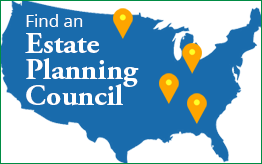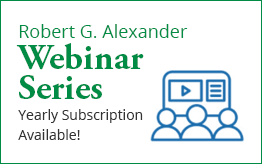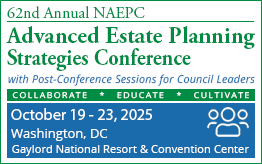July, 2006 Newsletter
Provided by Leimberg Information Services
See other issues.
Paul Hood's Last Words of Advice
In the estate planning process, clients (as well as their families) sometimes (often?) are uncomfortable contemplating mortality.
EXECUTIVE SUMMARY:
Every now and then, a client attempts to turn the tables on an estate planner. This type of client usually doesn't like or want to think about death in any event and is certainly not alone.
Paul Hood tells us that
"I've been asked by clients to contemplate my own mortality instead of just asking them to do so. They ask me if my will is done, fully expecting to hear a story akin to the one about the cobbler's children who have no shoes. These clients want me in the "death game" with them!
I usually explain that I have a will in place. I usually also go into some of my personal estate planning considerations, including life and disability insurance, that may apply to them, and I do so to hopefully prove my empathy."
This is a special LISI commentary that is especially appropriate at a time when federal estate taxes are becoming less and less the driving factor in most people's planning - and we professionals should be giving renewed consideration as to what should be of importance in the planning process.
HERE'S PAUL HOOD's "LAST WORDS OF ADVICE":
Recently, a client had an unusual and refreshing spin on this inquiry, and she really caused me to think - and feel.
That client asked me for the last advice that I'd impart to her - if I were on my deathbed. She said that in constructing her estate plan, we'd start with that most important advice, and then work from there. In other words, she was asking me for the nuggets of advice which I would consider so important that I would expend my final breaths on that advice-My "last best" advice.
Wow! I had to think about that carefully.
The last advice that I would give? Ever?
I wouldn't really have the luxury of time in which to give my final advice (I'm dying after all). I only have about 2500 or so words to spare here.
Final words?
Here goes.
FIRST, INVOLVE YOUR FAMILY!
Involve your family directly in your estate planning decisions. Your estate and financial planning decisions have ramifications and impacts upon your family and loved ones (including key employees in your company). These impacts can be financial, social and financial, and your decisions can and will affect their social relationships, jobs and even health.
The wisdom of the ages has always known this.
Consider the words of Seneca (a first century A.D. Roman philosopher), who said,
"What madness is it for a man to starve himself to enrich his heir,
and so turn a friend into an enemy!
For his joy at your death will be proportioned
to what you leave him."
Marcus Aurelius (Emperor of the Roman Empire in the second century A.D.), who said
"A great estate to those who do not know how to use it,
for nothing is more common
than to see wealthy persons living scandalously and miserably;
riches do them no service in order to virtue and happiness;
it is precept and principle, not an estate,
that makes a man good for something."
Or Niccolo Machiavelli (a fifteenth and sixteenth century Italian politician and author), in the famous work, The Prince,
"A son can withstand the death of his father,
but the loss of his inheritance will drive him to despair."
I could go on with quotes from others at all times of history and in different cultures. The message remains the same: people will be impacted by their ancestors' estate planning in ways other than just financially.
Since your family and loved ones are going to be changed by the results of your estate plan, why not involve them in its formulation? Even if someone is not going to get what he or she wants (or feels that he or she deserves), it usually is better for the other survivors to have had everyone know your plans while you are still alive.
Otherwise, a complainer might deny that this was your real intention. Or they might accuse the survivors who fared better of plotting against them. The prospects for challenge or acrimony increase dramatically when bad news is sprung on people who then feel trapped and without an option other than to attack.
One of the biggest problems in estate fights is that the "star of the show" has already departed this great world's stage. The job of the litigants and the court is to ferret out, often with only indirect evidence, which usually is colored by the position or feelings of the giver of that evidence, what you really intended and whether you were of sound mind and free from undue influence when you did it.
SHOULDN'T PRIVACY TAKE PRECEDENCE?
Some clients are taken aback by my suggestion that they discuss their estate planning with their family and loved ones, believing that their privacy was supposed to be the most important aspects of their estate planning. Quite often, the clients' parents didn't involve them in the parents' estate planning process.
This oversight on their parents' part is not justification for the client to repeat the mistake. I am not suggesting that you give your loved ones a vote in your estate planning decisions. Far from it. Estate planning doesn't have to be a democracy. However, their input and understanding of your intent could be vital to the success or effectiveness of your estate plan as well as in the relationships of your surviving loved ones. This is especially true in family businesses.
I recall a very sad situation where a dad was often cash poor because he was plowing significant sums into an insurance policy so that his son, who worked for the company, could preserve the business (which was named after the dad, as was the son) by being able to pay the estate taxes on the value of the business. Dad passed up vacations, additional salary (as did son, who was underpaid in any event) and some financial security so that the life insurance premiums would be paid on time.
When Dad died, the son took the insurance proceeds and then almost immediately sold the business.
When I asked the son why he was selling the business (at what was in my opinion a very low price), the son became emotional and told me that his dad had forced him to forego college and his own life dreams and aspirations for the "privilege" of working in the "family business." Breaking down into tears, the son told me that he had never liked the business and that he had wasted his life (the son was then in his 50's) working in the business.
The son went on in rage to say that he was commuting his own sentence to "time served" and that he didn't want to spend any more time imprisoned in "his father's monument to his own memory."
I observed to the son that his father had sometimes gone to significant financial hardship to continue to pay those life insurance premiums, and that his father had seemingly wasted those insurance premiums given the son's proposed sale. I wondered aloud whether his father would have paid those premiums had he known what the son was going to do. This brought only more rage and tears.
The son said that he indeed had told his father of his unhappiness and demonstrated that unhappiness through mediocre and disinterested work effort, but that his father never really "listened" to him.
The son analogized the insurance money, which was enough to live comfortably (but not extravagantly) for the rest of his life, to a reward for years of pain and suffering while toiling for a controlling, unappreciative parent who was hell-bent on controlling him for his entire lifetime and beyond. The son saw dad's "estate planning insured buy-sell agreement" as a way to perpetuate dead-hand control from the grave. The son thought it deliciously ironic that he was able to use the insurance proceeds, paid for by premiums for which his father had to work very hard, to chase his own dream rather than his dad's wishes. The son compared it to killing a robber with the robber's own weapon.
The sad fact is that had father and son listened to each other, they probably would have sold the business while dad was still alive, when the business was much more valuable.
GET THE PEOPLE IN YOUR FAMILY TALKING - AND GET THEM TO LISTEN - TO EACH OTHER - AND TO YOU!
Your plan for the future after you will be altered if everyone is not on the same page.
Talk to them about it. And listen to them. And get them to listen to each other - and to you!
And be sure YOU are listening - to them!
DIFFERENT TOOLS AND TECHNIQUES HAVE DIFFERENT AFFECTS:
Estate planning techniques have differing impacts on your loved ones. There are lots of different types of estate planning techniques, and there are many variations and options within each technique. Each technique (and variation thereon) has differing potential results on relationships and finances of your loved ones. Be cognizant of the differences when you are evaluating them for your family.
TAXES - ONLY PART OF THE EQUATION!
Don't let the Tax Tail Wag the Life Dog. Be wary of some types of techniques that some estate planners want you to implement just because they save taxes. In my opinion, too many estate planners pass up the opportunity to facilitate a family's healing or staying together by simply uniting them against a straw man enemy: IRS.
Now here's a real secret (some of my colleagues probably would even call it heresy, but hey, I'll be dead soon, right?): it is much harder (and more important) to create an estate plan that focuses upon not negatively altering relationships than it is to beat Uncle Sam out of estate taxes!
BE CAREFUL ABOUT BUYING INTO PANACEAS - AND EVEN MORE CAREFUL ABOUT FORCING RELATIONSHIPS!
We have seen popularity waves of various estate planning techniques. Currently in vogue is the family partnership or LLC, which has always been - and continues to be - a fine estate planning technique. However, the family partnership/LLC has taken on increased usage and popularity, particularly over the last five to ten years, often because of its attractiveness as an estate tax planning technique.
However, family partnerships/LLCs are not for every family, even if they save estate taxes. Many spouses make fine business partners. But not all. Silent or dutiful or cooperative children usually make fine partners, at least while at least one parent is alive. But some children are not as silent, not as dutiful, not as cooperative. This can be especially problematic where the parents ignore the partnership/LLC once established, which has tax and non-tax risks. Some children aren't suited to be, or know how to be, partners with parents or siblings. Some aren't suitable partners, period! The worst case here is a free-for-all by people who have been consigned together. The costs of untangling the financial and relationship matters (if it can be totally done) often are pretty close to any tax savings achieved.
I am not intending to be critical of the family partnership/LLC as an estate planning technique. I have assisted many in the formation of family partnerships/LLCs. However, it may well be that some estate planners have been heavy-handed in their "prescriptions" of family partnerships/LLCs without either discussing the side effects or doing any real analysis of the profile of the persons likely to be involved.
Maslow's admonition applies here:
"He who is good with a hammer begins to believe that everything is a nail."
There are other types of estate planning techniques.
TAKE CONTROL, GET INVOLVED, AND STAY IN CONTROL:
You must be in control of your estate planning process. Even though most estate plans are built to ensure control by a client, the sad fact is that most clients were not, will not be, or are not in control of the estate planning process. You may not have been in real control of selecting your estate planning advisors. Even if you were, you probably have had little say so about the makeup of the aspects of your estate plan.
Given all of the complexities involved in the techniques of estate planning, you can not be expected to know as much about the technical ins and outs of estate planning as your estate planning advisors. That is why you hired them. However, don't you know more about yourself, your family and your property than that advisor does? Of course you do. Your knowledge and input is a key ingredient in your estate plan.
I firmly believe that if more people felt like they could be in control of their estate planning, more people would do more of the estate planning that they should do.
You may ask why you should be in control of your estate planning process? Do you feel that your lack of knowledge of the technical aspects of estate planning compromises your ability to be in control of your estate planning? Do you feel confused and to some extent helpless when evaluating various estate planning tools or techniques? Do you think that controlling your estate planning in light of your lack of technical information about the "bricks" of estate planning increases the chances of a less then optimal estate plan?
My experience has been that the quality and strength of a client's estate plan is directly proportional to the client's control of and true involvement in the estate planning process.
Yet this seems to happen too seldom. Why? For starters if you are like most, you do not have a real conscious idea of what you really could accomplish or indeed what you want to accomplish in your estate planning. Your notion of your estate planning has to be and may vary significantly from what it could be. There may be psychological reasons why you will not tend to your estate planning. Maybe you feel that the grim reaper will not come for you for a long time. (Consider the client who wrote his own will and started it by writing, "If I die…")
AVOID PLANNING PARALYSIS:
I offer the following as another possible explanation: "planning paralysis," which is a feeling of helplessness or a fear of feeling helpless about the estate planning process. It also is a feeling which arises when people are dazed by the staggering number of estate planning options and decisions. We all like to be our own persons. We each want to control our own destiny.
Maybe you had (or heard about) a bad experience with an estate planning advisor. Maybe you just are uncomfortable revealing personal or financial information to an estate planning advisor or to anyone else. Maybe you just do not trust advisors, or you feel intimidated by them. You might be concerned about cost. Maybe you are concerned about not hurting someone's feelings. Or perhaps you just don't want to deal with uncomfortable thoughts.
However, I suspect the real reason that most people are slow to either begin or follow through on estate planning is a fear of loss of control. Individuals fear the unknown, the "ride" the advisor will put you once you get started with estate planning. I believe that people's fear of loss of control manifests itself in procrastination. Someone may feel that he or she lacks the requisite knowledge of the "bricks" of estate planning to intelligently argue with them.
There is no question that your estate plan should be much more important to you than to your estate planning advisors. Advisors can and indeed should push a client only so far.
However, an advisor should at least assist a client with drawing a clear picture as to why the client has not made progress with an estate plan. Once a client understands the real reason why he or she has not progressed, the client should at least be able to begin the process of dealing with his or her obstacles in the way of the estate plan which the client actually wants and understands.
ONE MORE (LAST?) TIME:
-
Get family members informed and involved.
-
Make sure you are listening - as well as talking - to each other.
-
Remember that each tool or technique you use will have an impact on family members. So try to match the tool or technique with your family members as well as to achieve your tax and other goals.
-
Don't lose your perspective about where tax savings fit into the overall equation; it's about a lot more than merely tax savings.
-
Don't force family members into a pressure cooker that's too hot for them to handle - or live in - together.
-
Take control and get and stay involved.
-
And don't get analysis paralysis. Do what you need to do to make intelligent and caring decisions.
But don't delay, because time IS of the essence - and no one knows if your time may be up - soon.
Like mine is.
PAUL HOOD
Edited by Steve Leimberg
CITE AS:
Steve Leimberg's Estate Planning Newsletter # 988 (June 29, 2006) at http://www.leimbergservices.com Copyright 2006 Leimberg Information Services, Inc. (LISI). Reproduction in Any Form or Forwarding to Any Person Prohibited - Without Express Permission.
All NAEPC-affiliated estate planning councils are eligible to receive a discounted subscription rate to the Leimberg LISI service. Please see more information about the offering. You may also contact your local council office / board member to find out whether they are offering the service as a member benefit.




